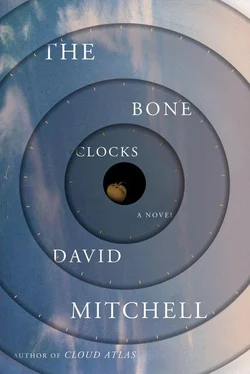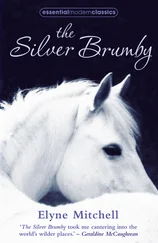… a mossy boulder, big as a troll’s head, on its side and brooding over an ancient wrong. I’m sitting on the ground with no memory of tripping, though I must have done; I’m aching all over. How the sodding hell did I get down here? A mini-stroke? Magicked by the elves of Ásbyrgi? I must have … what? Sat down for a breather, then nodded off. A breeze passes, the trees shiver, and a yellow leaf loop-the-loops, landing by a fluke of air currents on my palm. Look at that. For the second time today, I think of Mr. Chimes the conjuror. Not far away, a woman’s laughing. The campsite’s near. I get up — and notice a big cold stain down my thigh. Oh. Okay. The Wild Child of British Letters has suffered a somnambulant urethral mishap. Lucky there’s no Piccadilly Review diarist around. I’m only fifty-three — surely still a bit young for incontinence pads? It’s all chilly and clammy, like it happened a couple of minutes ago. Thank God I’m so close to the parking area, clean boxers, and trousers. Back to the fork, then turn left. Let us hurry, dear reader. It’ll be night before you know it.
IT LOOKS LIKE HALLDÓR LAXNESS splurged most of the Nobel dosh on Gljúfrasteinn, his white, blockist 1950s home halfway up a mist-smudged vale outside Reykjavik. From the outside it reminds me of a 1970s squash club in the Home Counties. A river tumbles by and on through the mostly treeless autumn. Parked in the drive is a cream Jag identical to the one Dad had. I buy my ticket from a friendly knitter with a cushy job and walk over to the house proper, where I put on my audio guide as directed. My digital spirit guide tells me about the paintings, the modernist lamps and clocks, the low Swedish furniture, a German piano, parquet floors, cherry-wood fittings, leather upholstery. Gljúfrasteinn is a bubble in time, as is right and proper for a writer’s museum. Climbing the stairs, I consider the prospect of a Crispin Hershey Museum. The obvious location is the old family home in Pembridge Place, where I lived both as a boy and as a father. The snag is, the dear old place was gutted by builders, the week after I handed over the keys, subdivided into six flats and sold to Russian, Chinese, and Saudi investors. Reacquisition, reunification, and restoration would be a multilingual and ruinously expensive prospect, so my current address on East Heath Lane, Hampstead, is the likeliest candidate — assuming Hyena Hal can persuade Bleecker Yard’s and Erebus’s lawyers not to whisk it away, of course. I imagine reverent visitors stroking my varnished handrails and whispering in awed tones, “My God, that’s the laptop he wrote his triumphant Iceland novel on!” The gift shop could be squeezed into the downstairs bog: Crispin Hershey key fobs, Desiccated Embryo mouse mats, and glow-in-the-dark figurines. People buy such bollocks at museums. They don’t know what else to do once they’re there.
Upstairs, the digital guide mentions in passing that Mr. and Mrs. Laxness occupied different bedrooms. So I see. Strikes a sodding chord. Laxness’s typewriter sits on his desk — or, more accurately, his wife’s typewriter, as she typed up his handwritten manuscripts. I wrote my debut novel on a typewriter, but Wanda in Oils was composed on a secondhand Brittan PC handed down by Dad as a birthday present, and it’s been ever-lighter, ever-trustier laptops ever since. For most digital-age writers, writing is rewriting. We grope, cut, block, paste, and twitch, panning for gold onscreen by deleting bucketloads of crap. Our analog ancestors had to polish every line mentally before hammering it out mechanically. Rewrites cost them months, meters of ink ribbon, and pints of Tippex. Poor sods.
On the other hand, if digital technology is so superior a midwife of the novel, where are this century’s masterpieces? I enter a small library where Laxness seems to have kept his overflow, and bend my neck to graze upon the titles. Plenty of hardbacks in Icelandic, Danish, I guess, German, English … and sodding hell —Desiccated Embryos !
Hang on, this is the 2001 edition …
… and Laxness died in 1998. Right.
Well, a kind gesture of the Hidden Folk.
GOING DOWNSTAIRS, I make way for a dozen teenagers trooping up. Where do Juno and Anaïs go on their school trips in Montreal? Not knowing saddens me. What a long-distance, part-time father I am. These twenty-first-century children of Iceland are plugged into headsets but still exude that Nordic confidence and sense of wellbeing, even the two African Icelanders and a girl in a Muslim headdress. All have a 2 in front of their birth year and need barely scroll down an inch when finding it on an online form. They carry a fragrance of hair conditioner and fabric conditioner. Their consciences are as undented as cars in a dealership showroom, and all are bound for the world’s center stage, where they’ll challenge, outperform, and patronize us old farts at our retirement parties, as we did when we looked that beautiful. Their teacher brings up the rear and smiles his thanks at me, and as he passes, a rather fine mirror is revealed on the Laxness stairway. From its deep square well of grays peers out a haggard look-alike of Anthony Hershey. Look at that. My metamorphosis into Dad is complete. Did some evil spirit at Ásbyrgi suck out the last of my youth? My hair’s thinner, my skin’s tired, my eyes bloodshot; my neck’s going all saggy and turkey-like … I summon a Tagore quote, for consolation: “Youth is a horse, and maturity a charioteer.” Dad’s aging lips twitch into a sneer and speak: “I see no charioteer. I see a sociology lecturer at a third-rate university who just learned that his department’s being axed because nobody except future sociology lecturers studies sociology anymore. You’re a joke, boy. Do you hear me? A joke.”
My prime of life is going, going, gone …
TRUDGING DOWN TO the Mitsubishi waiting in Gljúfrasteinn’s small car park, I check the time on my phone — and find a message from Carmen Salvat. It is not the message I might have wished to receive.
hello crispin pIs can we talk? x yr friend C
I huff. My soul still aches from being dumped, but I’m handling it. I don’t want to have to unhandle it, or un-unhandle it. We ingest our emotions, and grief for a lost relationship is not what I want to ingest. Carmen’s “yr friend” is code for “We won’t be getting back together” and “hello” instead of “hi” is the textual equivalent of a chilly air-kiss rather than a cheek-to-cheek contact kiss:
maybe not for a while, if that’s ok. It still hurts and I’m bored of the pain. No offense meant and mind yourself. C.
After pressing send I wish I’d taken more care to sound less petulant and/or self-pitying. Suddenly the river’s annoyingly clattery: How did Laxness get any work done, for buggery’s sake? The gathering clouds are lead-lined gray, not Zen gray. The aging day’s intersecting meanings form a crossword that defeats me, not inspires me, like it used to. I’m not as good a writer as Halldór Laxness. I’m not even as good a writer as the younger Crispin Hershey. I’m just as shit and uncommitted a dad as Dad, only his films will survive longer than my overregarded novels. My clothes are crumpled. My lecture’s at seven-thirty. My heart is still crusty with emotional scabs, and I don’t want them pulled off by a Spanish ex-partner.
No. We can’t talk. I switch off my phone.
“THE NAME OF my lecture is On Never Not Thinking About Iceland .” It’s a decent turnout at the House of Literature, but half of the two hundred attendees are here because the Bonny Prince Billy concert was sold out, and a portion of the silver-haired contingent showed up because they love Dad’s films. The only faces I know are Holly’s, Aoife’s, and Aoife’s boyfriend Örvar’s, sending me friendly vibes from the front row. “This car crash of a title,” I continue, “is derived from an apocryphal remark of W. H. Auden’s, spoken here in Reykjavik, for all I know on this very podium, to your parents or grandparents. Auden said that while he hadn’t lived his life thinking about Iceland hourly or even daily, ‘There was never a time when I wasn’t thinking about Iceland.’ What a delicious, cryptic statement. ‘Never not thinking about Iceland’? Why not just say, ‘Always thinking about Iceland’? Because, of course, double negatives are truth smugglers, are censor outwitters. This evening I’d like to hold Auden’s double negative”—I raise my left hand, palm up—“alongside this double-headed fact about writing,” right hand, palm up. “Namely, that in order to write, you need a pen and a place, or a study and a typewriter, or a laptop and a Starbucks — it doesn’t matter, because the pen and the place are symbols. Symbols for means and tradition. A poet uses a pen to write but, of course, the poet doesn’t make the pen. He or she buys, borrows, inherits, steals, or otherwise acquires the pen from elsewhere. Similarly, a poet inhabits a poetic tradition to write within, but no poet can single-handedly create that tradition. Even if a poet sets out to invent a new poetics, he or she can only react against what’s already there. There’s no Johnny Rotten without the Bee Gees.” Not a flicker from my Icelandic audience; maybe the Sex Pistols never made it this far north. Holly smiles for me, and I worry at how thin and drawn she’s looking. “Returning to Auden,” I continue, “and his ‘never not.’ What I take from his remark is this: If you’re writing fiction or poetry in a European language, that pen in your hand was, once upon a time, a goose quill held by an Icelander. Like it or not, know it or not, it doesn’t matter. If you seek to represent the beauty, truth, and pain of the world in prose, if you seek to deepen character via dialogue and action, if you seek to unite the personal, the past, and the political in fiction, then you’re in pursuit of the same aims sought by the authors of the Icelandic sagas, right here, seven, eight, nine hundred years ago. I assert that the author of Njal’s Saga deploys the very same narrative tricks used later by Dante and Chaucer, Shakespeare and Molière, Victor Hugo and Dickens, Halldór Laxness and Virginia Woolf, Alice Munro and Ewan Rice. What tricks? Psychological complexity, character development, the killer line to end a scene, villains blotched with virtue, heroic characters speckled with villainy, foreshadow and backflash, artful misdirection. Now, I’m not saying that writers in antiquity were ignorant of all of these tricks but,” here I put my balls and Auden’s on the block, “in the sagas of Iceland, for the first time in Western culture, we find proto-novelists at work. Half a millennium avant le parole, the sagas are the world’s first novels.”
Читать дальше












